
Table Of Content
- What should I do If I Get a Legal Notice?
- Is it Important to Reply to a Legal Notice?
- How to Reply to a Legal Notice?
- What should be mentioned in a Reply of a Legal Notice?
- After how many days should I Reply to a Legal Notice?
- Do I need an Advocate to reply to a Legal Notice?
- What can I do if the other party does not Reply to my Legal Notice?
- Conclusion
Legal Notice is a formal written communication that communicates a legal obligation or potential legal action to an individual or business entity. It forms part of compliance reminders and demands in relation to issues such as contract breaches, unpaid debts or property disputes. It identifies the issue at hand, the legal reason for this situation, what should be done and by whom, and time frames within which it should be addressed. Legal notice is just a step of informing the person who is supposed to respond to the same before other court procedures are initiated for example.
What should I do If I Get a Legal Notice?
On receipt of a legal notice; act promptly. To begin with, go through the notice carefully so as to understand what it is all about and why you are being accused. Indicate any deadlines that you have been given for responding. Collect and arrange any paperwork concerning the case at hand. Have your attorney provide professional advice on how best to respond in writing. Don’t disregard it because not responding will result in even more complications. The next step is what your lawyer tells you whether it is negotiating with others for settling out of court or following their instructions if they bring demands against you or on how you can prepare yourself for possible litigation with them. Keep track of all communications and actions taken in response to the notices received by clients.
Is it Important To Reply to a Legal Notice?
Certainly, it’s important to act quickly when faced with a legal notice. Ignoring it may result in legal implications, such as default judgments against you. Responding shows compliance with the legal process and safeguards your rights and interests. But, if you receive a legal notice, you should know what type of legal notice you received before replying. You may want to respond even if you think that these claims are untrue or unfounded because this will allow you to air your side of the story and possibly resolve the matter before it worsens. Enquiring from an attorney can help apply the best path while keeping the response fitting and within acceptable legal limits.
How to Reply to a Legal Notice?

Replying to a Legal notice is a crucial task because by replying to the legal notice you are telling the other party about your side on the matter. Also, it may decide how strong a position you hold in the matter. Therefore taking an Advocates help is highly recommended. you are considering using our legal notice service to reply to a legal notice you received, where an expert advocate will talk to you to understand the matter carefully and will help you write a strong reply mentioning everything clearly. Here are the steps of replying a legal notice:
- Go to our website edrafter.in and click on legal notice in the Legal services section of our main menu.
- Now, you will be redirected to our Legal Notice page, here you need to fill the form with all the asked details.
- We will schedule a call with an expert Advocate and share the meeting details on call as well as on your email.
- During the call, you need to tell everything about the case to our advocate and the Advocate will also ask you a few questions regarding your case.
- Now, the Advocate will draft a legal notice reply and share the draft with you in your mail for your approval. Here you can check the legal notice draft and ask for any changes if you want.
- Advocate will make the changes you asked for and share the draft again with you for approval.
- Once you approve the draft, the Advocate will send the reply to the other party on your behalf.
So these are the simple steps of replying to a legal notice. So if you received a Legal notice and want to reply so you can use our Legal notice service
What should be mentioned in a Reply of a Legal Notice?
In the reply of a legal notice it is essential to provide the response in a clear and concise manner addressing all the raised issues in a legal notice that are:
- Understanding of Allegations: Indicate your understanding of the raised issues made against you in the notice
- Acknowledge Receipt: one should always acknowledge the receipt of legal notice and reference the date you received it.
- Position Statements: if you dispute the claim, provide reasons or evidence. If the notice is acknowledged by you then the reply should indicate your willingness to address them and propose a resolution.
- Professional Tone: Maintain a respectful and professional tone throughout your reply.
After how many days should I Reply to a Legal Notice?
The Specific time for replying to the legal Notice can vary on the jurisdiction and the nature of the Notice. In some Cases, there may be a deadline specified in which the notice itself or mandates by Local Regulations. It is important to review the notice carefully and precisely to determine any deadlines or requirements for the response.
Moreover, as a general guideline, it’s advisable to respond to a legal notice as soon as possible. Ignoring or delaying the response can lead to adverse consequences that can cause default judgement against you. If one is unsure about the appropriate timeframe for responding to a specific legal notice, consult with a lawyer experienced in the relevant areas of law that can provide guidance tailored to your situation.
Also Read, Legal Notice vs Court Notice
Do I need an Advocate to reply to a Legal Notice?

For whether you should have an advocate answer to a legal notice necessitates analyzing several things like the intricacy of legal matters, your knowledge in court procedures and what will follow after the notice. In some cases, it is not always mandatory to engage an advocate into such affairs yet their professionalism can be of much assistance when it comes to maneuvering through the complex procedures that come with it.
An attorney can guide you strategically, aid in drafting a legally admissible response and represent your interests effectively. They can assist you in making sense of the notice’s consequences, identifying areas where you may have a weak case and how best to respond.
Moreover, being represented by an attorney offers peace of mind as he or she will be there for you throughout the process. But if your issue is simple enough for you to handle on your own; then there might be no need for involving a professional lawyer in answering your legal notice. Essentially, this choice has to consider such things as individual circumstances and complexity of issues involved.
What can I do if the other party does not Reply to my Legal Notice?
If the other party fails to reply to your legal notice, several options are available to pursue resolution:
- Follow-Up Communication: Send a reminder or follow-up communication to the other party, emphasizing the importance of addressing the issues raised in your notice and requesting a response within a reasonable timeframe,
- Mediation or Arbitration: Consider alternative dispute resolution methods like mediation or arbitration. These processes can facilitate negotiation and resolution outside of court, even if the other party is initially unresponsive.
- Legal Action: If communication and alternative dispute resolution methods fail, you may consider initiating legal proceedings. Consult with a lawyer to assess the viability of filing a lawsuit to enforce your rights or seek remedies as outlined in your initial notice.
- Default Judgment: In some cases, the failure of the other party to respond to your legal notice may result in a default judgment in your favor. However, this typically requires initiating formal legal proceedings and obtaining a court ruling.
Conclusion
Acting promptly in responding to a legal notice secures your rights and interests. Ignoring a legal notice can have serious consequences such as default judgments and complications with law. One must appreciate the charges leveled against them; get appropriate legal counsel if need be; and respond at an opportune moment. By dealing with these concerns professionally and comprehensively raised in the notice, it is possible that an amicable resolution can be achieved without further litigation complicating issues. It is therefore necessary for one to consult a lawyer as well as keep records of communications made or steps taken thereby assisting in effectively navigating through the entire process legally.


